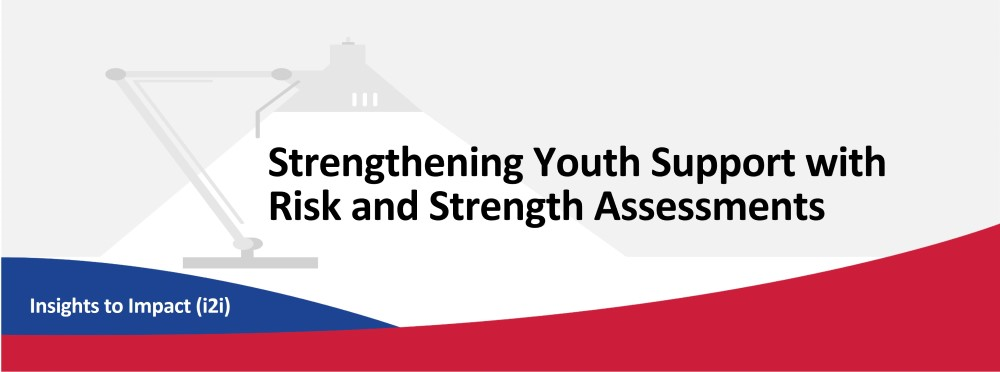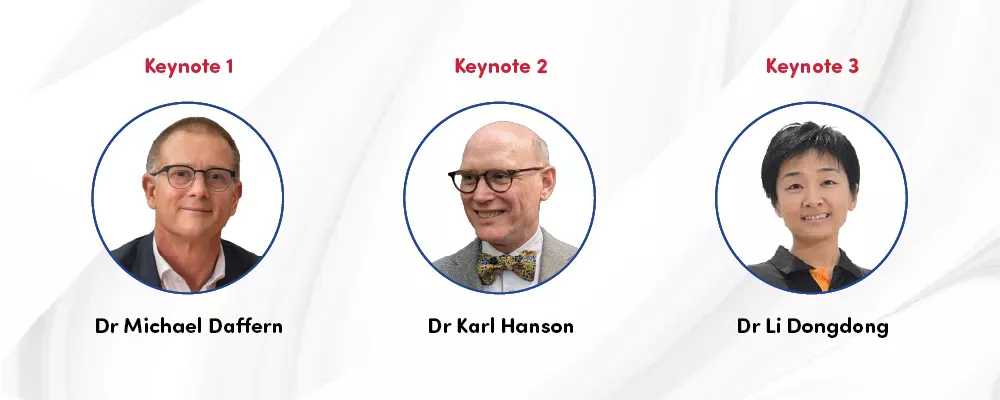- Home
- What's happening
- Events
- Insights to Impact (i2i): Strengthening Youth Support with Risk and Strength Assessments
Insights to Impact (i2i): Strengthening Youth Support with Risk and Strength Assessments
17 September 2025
Strengthening sector capabilities in the using of assessments to support early intervention and offender rehabilitation.

Overview
This seminar explores youth offender rehabilitation, aiming to enhance the sector’s knowledge and capabilities in using assessments to guide early intervention, offender rehabilitation, and reintegration.
Event details
Date | 17 September 2025 |
Time | 9:15 am to 5:00 pm |
Venue | Marina Bay Sands |
Programme Line Up
Keynotes

Keynote 1: Lessons learned from our neighbours: An exploration of rehabilitation approaches used in Asian jurisdictions to help people who have offended
Speaker: Dr Michael Daffern, Professor of Clinical Forensic Psychology and Director of the Centre for Forensic Behavioural Science, Swinburne University of Technology
Many contemporary models to guide criminal justice and forensic mental health rehabilitation and recovery originated in the West. Although these models have been adopted in numerous international jurisdictions, questions have been raised about whether these approaches are appropriate in Asia, where there are different histories, cultures, and resources. It is also increasingly clear that various ways of working with people who have offended exist and many different activities can help people change. An openness to explore different interventions and rehabilitative approaches is necessary to help guide responsive practice and services. This presentation provides an overview and comparison of rehabilitation approaches used in multiple Asian jurisdictions, exploring the extent to which Western models have been imported and how they have been adapted. It also describes some different approaches that are embraced in some Asian jurisdictions. Such information may help practitioners and policy makers create new services and adapt their own practices to meet the needs of the communities they serve.
Keynote 2: Toward a Common Language for Risk and Strengths Assessment
Speaker: Dr Karl Hanson, President of SAARNA (Society for the Advancement of Actuarial Risk Need Assessment) and Adjunct Faculty in the Psychology Department of Carleton University
We cannot do everything with everybody. Risk assessments help social service agencies target scarce resources to those most in need. A common understanding of risk levels is required in order to translate research into practice, and for risk communication among professionals. However, risk level labels (e.g., low/moderate/high) typically vary across risk tools, settings, and practice networks. This presentation reviews international research on the development of standardised risk levels for crime and violence, and outlines how a common language for risk and strength assessment could improve services for at-risk youth in Singapore. Based upon the 5-Level System developed by the US Council of State Governments and Public Safety Canada (Hanson et al., 2017), I review standardised risk levels for general criminal recidivism, violent recidivism, sexual recidivism, and intimate partner violence. I then focus on risk levels for youth at risk for crime and violence, and describe how this common language could be implemented in Singapore.
Keynote 3: Translating Assessments into Meaningful Action: A Singapore Perspective on Youth Offender Rehabilitation
Speaker: Dr Li Dongdong, Principal Research Specialist at the Translational Research Division, National Council of Social Service (NCSS)
Youth offending represents a critical turning point where timely intervention can significantly reshape future outcomes. Around the world, justice systems are increasingly recognising the importance of moving beyond a purely risk-focused approach towards a more balanced rehabilitative model that also emphasises individual strengths factors. This presentation showcases Singapore’s evidence-based approach to youth offender rehabilitation, emphasising the synergy between comprehensive risk assessment and strength-based interventions.
Drawing from current trends and longitudinal data in Singapore's youth offending landscape, we examine how standardised risk and strength assessment tools have been validated for local use. We demonstrate how a dual focus on both risk and strength assessment enables practitioners to craft more nuanced and effective case plans, leading to improved rehabilitation trajectories. Through empirical evidence, we illustrate how assessment tools serve as dynamic indicators of progress rather than mere diagnostic instruments.
Plenary Sessions
Agile Assessment and Evaluation Systems: Towards Data-informed Service Planning
Speakers: Mr Dennis Teo (NCSS) and Mr Clifton Paul (MSF)
While evidence-based practices are increasingly valued in social services, implementing them presents significant operational hurdles. Traditional programme evaluation and data analysis demand substantial resources, and the resulting insights frequently lag behind operational needs.
This presentation introduces two innovative systems that deliver timely data insights to frontline operations. The first, Agile Programme Evaluation, makes it quick and affordable to measure if youth programmes are making a difference. In the past, if an organisation wanted to know if their programme was working, they had to spend significant time and money collecting data from youths who didn't join their programme to compare results. Now, this system does the heavy lifting - it automatically finds similar youth groups from sector-wide data (i.e., NCSS’s Sector Evaluation Framework) to analyse how well a programme’s clients are faring in comparison. This also allows organisations to track performance of multiple programmes in a cost-efficient manner over the longer-term. The second system, Prioritising Optimum Intervention Targets (POINT), enhances case planning through recommendation algorithms that help case managers identify critical intervention areas for each rehabilitation case using their risk assessment information, enabling more targeted support strategies. Drawing from our pilot implementation in probation services, we will demonstrate how these systems help organisations integrate data-informed decisions into their service delivery.
Adverse Childhood Experiences (ACEs) Profiles among Youths with Sexually Abusive or Violent Behaviours
Speakers: Dr Lue Fang (MSF) and Mr Jeremy Tan (MSF)
A study of 320 youth cases (2012–2023) referred to MSF’s Psychology Services revealed three distinct Adverse Childhood Experience (ACE) profiles: Low ACE, Violent/Disorganised Environment, and Poly-victimised. Youths with Violent/Disorganised environment or Poly-victimised profiles showed higher risks of gang involvement, substance use, and truancy than those with the Low ACE profile. A majority of Youths referred for violent behaviours were from the Violent/Disorganised environments profile, followed by Poly-victimised. In contrast, a majority of Youths referred for sexually abusive behaviours were of the Low ACE profile, followed by Poly-victimised.
The findings highlight opportunities to enhance engagement strategies and therapy planning based on ACE profiles. Early identification of adversity through school and community touchpoints could strengthen prevention efforts. This study is intended to inform trauma-informed practices and support professional discussions.
Identifying and supporting at-risk youths with family adversities
Speaker: Dr Teo Qiao Kang (NCSS)
Early identification and support for families experiencing adversities can help prevent youth offending. Through analysis of population-level administrative data from 686,800 children born between 1990 and 2004, we demonstrate how evidence-based insights can enable more targeted and timely prevention efforts. Our findings reveal that among various family adversities, parental offending emerges as one of the strongest risk factors associated with youth offending, indicating intergenerational transmission of criminality. This relationship becomes even more pronounced when families face additional challenges, such as divorce or financial difficulties. Yet our findings also identify key protective factors that can mitigate the impact of parental offending. These insights offer valuable opportunities to strengthen upstream efforts by enabling earlier identification of at-risk youth and families, optimising the timing of support services, and informing decisions about resource prioritisation.
Transforming Youth GO! Programme
Speakers: Ms Tan Chui Li (MSF) and Mr Benjamin Yeo (Fei Yue Community Services)
The presentation will cover MSF’s ongoing review of the Youth GO! Programme (YGP) to move upstream to provide more support for youths at risk of first-time offending. This includes our efforts to work with schools to identify these youths, and enhancing the programme to holistically address their needs by introducing a standardised assessment tool for case planning and strengthening family intervention. MSF will also review the programme’s outcome indicators to better measure effectiveness. Apart from this, the presentation will provide an overview of a new practice guide which MSF and YGP service providers are co-creating to better address the youths’ risk factors and enhance their protective factors.
